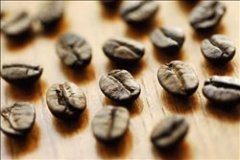A brief introduction to the description of the flavor and flavor characteristics of Tanzania coffee, which is as famous as Blue Mountain Coffee.

Usually its acidity is relatively mild, after the entrance, it evenly stimulates the taste buds in the middle and both sides of the back of the tongue, feeling a bit like the sour taste of tomato or soda. After moderate or more moderate baking, it has a strong aroma, then grind it into a fine powder, soak it in a pot of boiling water, and invite friends to sit around and taste it.
Coffee exports from Tanzania (Tanzania) play an important role in the whole national economy. In the past, the coffee industry in Tanzania has been dominated by manor cultivation, but now more than 85% are grown by small farmers. Many small farmers form cooperative organizations, the most important of which is the Kilimanjaro Cooperative Alliance (Kilimanjaro Cooperative Union, referred to as KNCU). Tanzanian coffee is sold by the Tanzanian Coffee Management Council (Tanzanian Coffee Marketing Board, TCMB) to private exporters by auction. In the 1980s, most coffee sales in Tanzania shifted from auctions to being sold directly to the Tanzania Coffee Management Committee.
That has changed and the coffee industry is being reformed to allow individuals or groups to buy coffee in the future, when coffee will be graded in different ways in order to attract buyers from Germany, Finland, the Netherlands, Belgium and Japan.
Tanzanian coffee is a high-end brand coffee, which has received a great deal of attention recently. In fact, coffee from Tanzania has long been loved by Europeans and is among the most famous products. Europeans give Tanzanian coffee the nickname "coffee gentleman", and Chinese coffee connoisseurs call it the "coffee swordsman" with the mocha of the "King of Coffee" and the "Lady of Coffee".
Coffee beans in Tanzania have extraordinary quality. Most coffee is grown on small-scale farms and the coffee produced is mainly for export. Although the aroma of coffee is not much different from that of Kenya, a neighboring coffee producer, the production technology or raw bean processing equipment lags far behind Kenya. Tan produced near the Kilimanjaro Mountains, 1800 meters above sea level is the most suitable area for growing coffee, thanks to volcanic ash cover and snow watering, giving the coffee here a strong texture and soft acidity. It exudes a delicate fragrance, with aromas of wine and fruit, making people taste endless aftertaste.
The characteristics of Tanzanian coffee:
Flavor: full-bodied and refreshing, with lower acidity than Kenyan coffee, pure flavor and aroma
Suggested baking method: medium baking
After drinking Tanzanian coffee, I always feel a soft and mellow earthy smell at the corners of my mouth. Coffee gourmets often use words such as "wild" or "wild" to describe it. It can be said that pure Tanzanian coffee is "the most African coffee".
Important Notice :
前街咖啡 FrontStreet Coffee has moved to new addredd:
FrontStreet Coffee Address: 315,Donghua East Road,GuangZhou
Tel:020 38364473
- Prev

Coffee Gentleman A brief introduction to the characteristics of Taste and aroma of Tanzania Coffee
Many of the farm owners' families have lived here for generations of immigrants, including Indians, Scandinavians, British, and, of course, locals, but most of them are small farms. however, the managers of farms and processing farms are mostly local people. Labor in Tanzania is cheap, so in taking care of the farm pruning and maintenance of coffee plantations, many rely on manual processing, not on
- Next

A brief introduction to the treatment method of grinding degree and baking degree of high-quality coffee beans in Tanzania
Coffee exports from Tanzania (Tanzania) play an important role in the whole national economy. In the past, the coffee industry in Tanzania has been dominated by manor cultivation, but now more than 85% are grown by small farmers. Many small farmers form cooperative organizations, the most important of which is the Kilimanjaro Cooperative Alliance (Kilimanjaro Cooperative Union, referred to as KNCU)
Related
- Detailed explanation of Jadeite planting Land in Panamanian Jadeite Manor introduction to the grading system of Jadeite competitive bidding, Red bid, Green bid and Rose Summer
- Story of Coffee planting in Brenka region of Costa Rica Stonehenge Manor anaerobic heavy honey treatment of flavor mouth
- What's on the barrel of Blue Mountain Coffee beans?
- Can American coffee also pull flowers? How to use hot American style to pull out a good-looking pattern?
- Can you make a cold extract with coffee beans? What is the right proportion for cold-extracted coffee formula?
- Indonesian PWN Gold Mandrine Coffee Origin Features Flavor How to Chong? Mandolin coffee is American.
- A brief introduction to the flavor characteristics of Brazilian yellow bourbon coffee beans
- What is the effect of different water quality on the flavor of cold-extracted coffee? What kind of water is best for brewing coffee?
- Why do you think of Rose Summer whenever you mention Panamanian coffee?
- Introduction to the characteristics of authentic blue mountain coffee bean producing areas? What is the CIB Coffee Authority in Jamaica?

